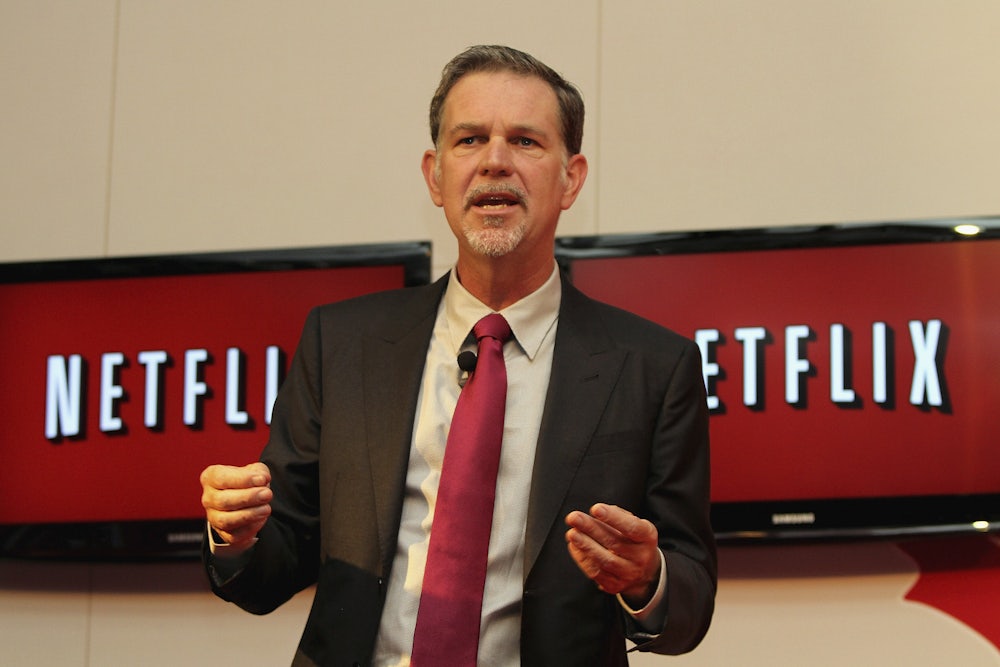For years—decades, really—Netflix hasn’t particularly needed to know what it was doing. Awash with venture capital money, the DVD mailer turned streaming service–film and television studio simply obliterated the competition, leaving a trail of destruction (abandoned Blockbuster video stores, empty movie theaters) in its wake. In the early months of the pandemic, bleak blog posts declared Netflix one of the “winners” of the pandemic: With everyone stuck at home, with nothing else going on, there was little to do but let the streaming giant’s bevy of content—much of it as godawful and forgettable as anything from the heyday of network television—wash over your broken mind and body.
Netflix’s long run of winning easy now seems to be at an end. Its first-quarter results for 2022 were horrific: After years of practically exponential growth, it lost 200,000 subscribers—not a huge number but one that augured the end of the salad days. New competition—particularly from Disney+ but also from Amazon and HBOMax—had finally started to cut into the endless gravy train. People emerging from the pandemic had other stuff to do. And a lot of the content Netflix was producing just wasn’t resonating with audiences or critics the way it once did. The company’s stock has lost nearly half of its value since it posted its first-quarter results in mid-April.
What now for the streaming giant? As The Hollywood Reporter’s Borys Kit wrote on Wednesday, no one really has any clue:
As it moves forward, Netflix wants to focus on making bigger movies, making better movies, and releasing fewer than it previously did at a gluttonous pace. “Just a few years ago, we were struggling to out-monetize the market on little art films,” Netflix co-chief Ted Sarandos told analysts on the company’s April earnings call. “Today, we’re releasing some of the most popular and most watched movies in the world. Just over the last few months, things like Don’t Look Up and Red Notice and Adam Project, as examples of that.” But what this “bigger, better, fewer” directive means is unclear to those inside and outside the company.
“Bigger, better, fewer” is also strikingly more in line with the way Hollywood studios have recently begun to operate. For much of its existence, Netflix has thought of itself as a tech company, moving fast and breaking things; now it’s seeking to emulate the dinosaurs it once thought it would effortlessly replace.
But it’s not easy to parse what Netflix precisely means by its “bigger, better, fewer” mandate; harder still to fathom what another word that pops up in the Hollywood Reporter piece—“discipline”—means in context. There are some clues, though. It’s clear that Netflix plans to toss around big money on acquisition, “as evidenced by the recent $50 million-plus deal for the Emily Blunt thriller Pain Hustlers,” writes Kit. But in terms of content creation, “the goal will be to make the best version of something instead of cheapening out for the sake of quantity,” as one insider tells Kit. “Expect to see a more subtle change,” adds another inside source. “Instead of making two movies for $10 million, as an example, the company will make one for $20 million.” These are some amusing distinctions, considering that as part of its most recent round of budget cuts, Netflix gutted its independent features division, which was tasked with making exactly these types of films.
Perhaps the biggest clue as to what “bigger, better, fewer” means is in another section of the article:
One thing many agree on is that the era of expensive vanity projects at Netflix, whether animation or live action (like Martin Scorsese’s $175 million The Irishman), is likely over. “This tendency to do anything to attract talent and giving them carte blanche is going away,” says one person.
This would be anything but a “subtle change.” The argument that Netflix’s touts have levied in defense of the firm as it has gobbled up market share, terraforming the entertainment industry to its liking, is that it’s been a refuge for creatives—a place where directors can make the art they want without fear of being reined in. Desperately seeking an Oscar, Netflix has, in recent years, produced a number of stunning works by legendary directors, The Irishman, Alfonso Cuaron’s Roma, and Jane Campion’s The Power of the Dog being three recent, Academy Award–nominated examples.
The decision to back away from this type of fare—labeled “vanity projects” by Kit, who seems to be channeling the attitude of many executives—is revealing about what Netflix was doing by pursuing these directors. There was clearly an effort to brand Netflix as a place for everyone—not just folks looking to idle away a few hours watching reruns of New Girl or one of its endless, cobbled-together true crime documentaries—but also those who wanted to keep up with the latest work from top filmmakers. Naturally, establishing this brand identity served another purpose: It was a tidy public relations stunt designed to stave off the bad press that might naturally flow from the fact that ... you know, it was destroying the film and television industry in the name of “disruption.”
Now that Netflix is more desperate to please investors than it is to win over cinéastes, the company is backing away from producing movies that matter and doubling down on blockbuster fare that it thinks will keep its subscribers from fleeing to other streaming services. The latest season of Stranger Things, an expensive, bloated project in which each episode cost $30 million and the finale is more than two and a half hours long, may be a case in point: This is a streaming service that’s trying to offer more of what it thinks it viewers want, something akin to the Marvel strategy. Welcome to the Netflix extended universe!
This is a radical change of pace for a network that famously made a practice of canceling many popular series after brief runs—the thinking being that once it hooked the fans on the Netflix artistic vibe, it was unimaginable that anyone would want to be anywhere else but on the platform’s infinite scroll. The success of newer streaming services like Apple+ and HBOMax, which have largely taken a quality over quantity approach, suggests that Netflix may still be learning the wrong lesson. But one thing remains consistent: Netflix is still the same ruthless, predatory, constantly-chasing-the-lowest-common-denominator firm it has always been. The only difference is that the company is finally facing something it failed to anticipate might emerge one day: competition.










